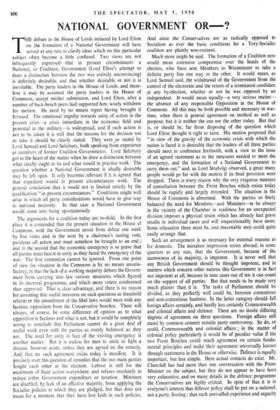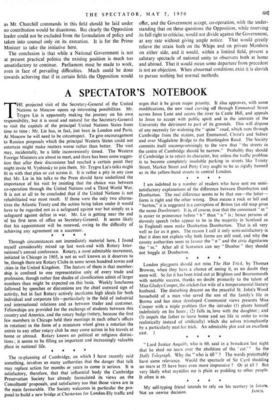NATIONAL GOVERNMENT OR
THE debate in the House of Lords initiated by Lord Elton on the formation of a National Government will have served at any rate to clarify ideas which on this particular subject often become a little confused. Two views are not infrequently expressed—that in present circumstances a National, or Coalition, Government (Lord Elton's attempt to draw a distinction between the two was entirely unconvincing) is definitely desirable, and that whether desirable or not it is inevitable. The party leaders in the House of Lords, and there- fore it may be assumed the party leaders in the House of Commons, accept neither submission, and Lord Elton, after a number of back-bench peers had supported him, wisely withdrew his motion. He need by no means regret having brought it forward. The emotional impulse towards unity of action in the present crisis—a crisis immediate in the economic field and potential in the military—is widespread, and if such action is not to be taken it is well that the reasons for the decision not to take it should be clearly stated. They were ,so stated by Lord Samuel and Lord Salisbury, both speaking from experience as members of former Coalition Governments. Lord Salisbury got to the heart of the matter when he drew a distinction between what ideally ought to be and what would in practice work. The question whether a National Government is ideally desirable may be left open. It only becomes relevant if it is agreed that that expedient would in present circumstances work. The general conclusion that it would not is limited strictly by the qualification "- in present circumstances." Conditions might well arise in which all party considerations would have to give way to national necessity. In that case a National Government would come into being spontaneously.
- The arguments for a coalition today are twofold. In the first place it is contended that the present situation in the House of Commons, with the Government saved from defeat one week by five votes and in the next by a chairman's casting vote, paralyses all action and must somehow be brought to an end : and in the second that the economic emergency is so grave that all parties must face it in unity as they faced the emergency of the war. The first contention cannot be ignored. From one point of view the situation in the Commons is by no means unsatis- factory, in that the lack of a working majority debars the Govern- ment from carrying into law various measures which figured in its electoral programme, and which more voters condemned than approved. That is clear advantage, and there is no reason for assuming that useful measures on such questions as leasehold reform or the amendment of the libel laws would meet with any factious opposition from the Conservative benches. There will always, of course, be some difference of opinion as to what opposition is factious and what is not, but it would be completely wrong to conclude that Parliament cannot do a great deal of useful work even with the parties as evenly balanced as they are. The need for unity in face of the existing emergency is another matter. But it is useless for men to unite to fight a disease, however acute, unless they are agreed on the remedy. And that no such agreement exists today is manifest. It is precisely over this question of remedies that the two main parties fought each other at the election. Labour is still for the maximum of State action everywhere, and refuses resolutely to reduce either Government expenditure or taxation. Ministers are disabled, by lack of an effective majority, from applying the Socialist policies to which they are pledged, but that does not mean for a moment that they have lost faith in such policies. And since the Conservatives are as radically opposed to Socialism as ever the basic conditions for a Tory-Socialist coalition are plainly non-existent.
Much more might be said. The formation of a Coalition now would mean extensive compromise over the heads of the electors, who have sent Members to Westminster to take a definite party line one way or the other. It would mean, as Lord Samuel said, the withdrawal of the Government from the control of the electorate and the return of a nominated candidate at any by-election, whether or not he was opposed by an independent. It would mean equally—a very serious matter— the absence of any responsible Opposition in the House of Commons. All this may be both possible and necessary in war- time, when there is general agreement on method as well as purpose, but it is neither the one nor the other today. But that is, or should be, far from disposing of the question which Lord Elton thought it right to raise. His motion proposed that " in view of the gravity of the economic crisis with which the nation is faced it is desirable that the leaders of all three parties should meet in conference forthwith, with a view to the issue of an agreed statement as to the measures needed to meet the emergency, and the formation of a National Government to carry them out," and, as Lord Strabolgi observed, a great many people would go far with the motion if its final provision were dropped. There is every reason why the very exiguous measure of consultation between the Front Benches which exists today should be rapidly and largely extended. The situation in the House of Commons is abnormal. With the parties so finely balanced the need for Members—and Ministers—to be always in the vicinity of the Chamber in readiness for an unexpected division imposes a physical strain which has already had grave results in individual cases and will unquestionably have more. Some relaxation there must be, and reasonable men could quite easily arrange that.
Such an arrangement is as necessary for external reasons as for domestic. The mistaken impression exists abroad, in some quarters at any rate, that the Government, because of the narrowness of its majority, is impotent. It is never well that any British Government should be thought impotent, and in matters which concern other nations this Government is in fact not impotent at all, because in nine cases out of ten it can count on the support of all parties. But that needs to be made very much plainer than it is. The tasks of Parliament should be divided, as they perfectly well could be, between contentious and non-contentious business. In the latter category should fall foreign affairs certainly, and hardly less certainly Commonwealth and colonial affairs and defence. There are no doubt differing degrees of agreement on these questions. Foreign affairs still stand by common consent outside party controversy. So do, or could, Commonwealth and colonial affairs ; in the matter of colonial policy particularly it would be of peculiar value if the two Front Benches could reach agreement on certain funda- mental principles and make their agreement universally known through statements in the House or otherwise. Defence is equally important, but less simple. Here actual contacts do exist. Mr. Churchill has had more than one conversation with the Prime Minister on the subject, but they do not appear to have been very exhaustive, and on many details in the defence programme the Conservatives are highly critical. In spite of that it is in everyone's interest that defence policy shall be put on a national, not a party, foOting ; that such unrivalled experience and sagacity as Mr. Churchill commands in this field should be laid under no contribution would be disastrous. But clearly the Opposition leader could not be excluded from the formulation of policy and taken into counsel only on its execution. It is for the Prime Minister to take the initiative here.
The conclusion is that while a National Government is not at present practical politics the existing position is much too unsatisfactory to continue. Parliament must be made to work, even in face of prevailing difficulties. Much could be done towards achieving that if in certain fields the Opposition would offer, and the Government accept, co-operation, with the under- standing that on these questions the Opposition, while reserving its full right to criticise, would not divide against the Government, at any rate without giving ample notice. That would greatly relieve the strain both on the Whips and on private Members on either side, and it would, within a limited field, present a salutary spectacle of national unity to observers both at home and abroad. That it would mean some departure from precedent is not an objection. When abnormal conditions exist it is slavish to pursue nothing but normal methods.







































 Previous page
Previous page